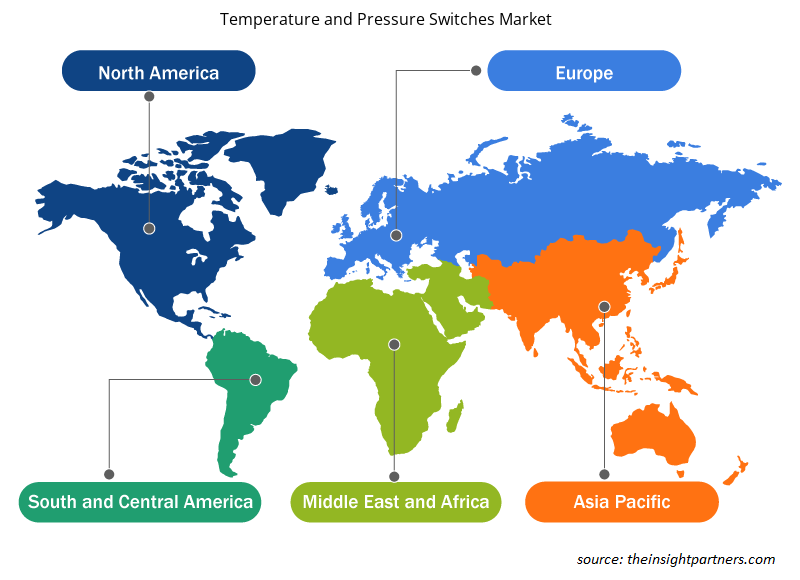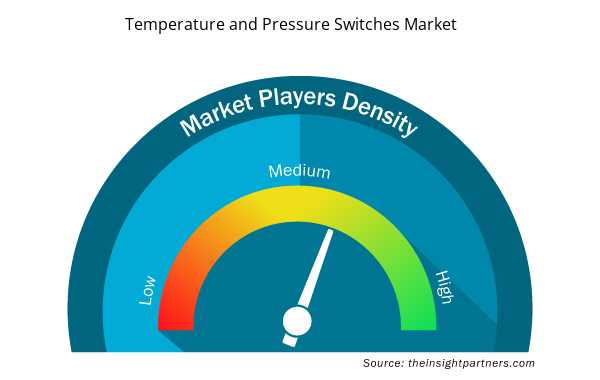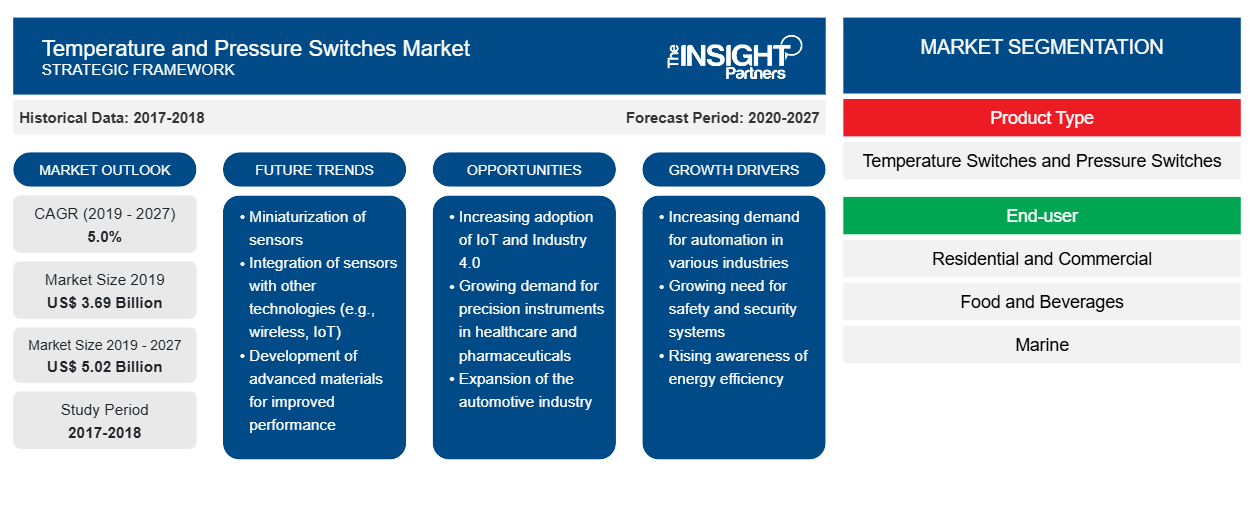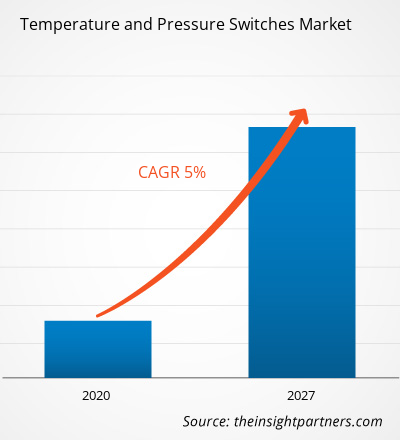2019 年温度和压力开关市场价值为 36.8962 亿美元,预计到 2027 年将达到 50.2318 亿美元;预计 2020 年至 2027 年的复合年增长率为 5.0%。
近年来,尤其是在发达国家,制造过程中采用自动化技术的速度不断加快。因此,这些国家正大力关注智能工厂的采用。制造设施数量较多的国家(包括美国、加拿大、中国、英国、日本、德国和法国)正在各行各业的制造设施中不断寻求自动化技术。全球对高端汽车的需求不断增加,导致汽车产量增加,主要是在北美和欧洲等发达地区。商用车和乘用车的需求正在增加,主要是在发展中国家。例如,根据国际锡业协会有限公司的数据,2014 年,中国报告生产了 2400 万辆汽车,到 2030 年和 2050 年,这一数字将分别增至 3.64 亿辆和 6.07 亿辆。因此,汽车行业投资的不断增长刺激了对温度和压力开关的需求。此外,工业物联网 (IIoT) 和智能工厂的出现使最终用户能够为其制造设施采购技术先进的解决方案,最终通过提高生产率来增加利润,从而使他们受益。IIoT 的实施正在全球各行各业中蓬勃发展。这引领了温度和压力开关市场的增长之路
定制此报告以满足您的需求
您可以免费定制任何报告,包括本报告的部分内容、国家级分析、Excel 数据包,以及为初创企业和大学提供优惠和折扣
- 获取此报告的关键市场趋势。这个免费样品将包括数据分析,从市场趋势到估计和预测。
COVID-19 疫情对温度和压力开关市场的影响
COVID-19 疫情的突然爆发,使该国经济陷入困境,对海洋、军事和国防等多个行业产生了不利影响,从而对温度和压力开关市场产生了负面影响。因此,持续的 COVID-19 危机和全球危急局势将在未来几个季度对北美地区的温度和压力开关市场增长产生负面影响。
市场洞察——温度和压力开关市场
汽车产量不断增长,汽车行业对温度和压力开关的需求不断增长
商用车和乘用车的需求正在增长,尤其是在发展中国家。例如,根据国际锡业协会有限公司的数据,2014 年,中国报告生产了 2400 万辆汽车,到 2030 年和 2050 年,这一数字将分别增至 3.64 亿辆和 6.07 亿辆。因此,汽车行业投资的不断增长推动了对温度和压力开关的需求。根据非营利组织汽车研究中心的数据,2018 年,FCA、通用汽车、福特、现代、日产、大众和丰田等汽车制造商在汽车行业投资了 48 亿美元。此外,在欧洲,汽车研发 (R&D) 投资增长了 6.7%,达到每年 670.9 亿美元。温度开关被牢固地集成在散热器风扇、警告灯和冷却液监测系统中,以持续监测车辆部件的温度。
基于最终用户的见解
根据最终用户,温度和压力开关市场细分为住宅和商业、食品和饮料、船舶、汽车、航空航天和国防、化学品、石油和天然气等。汽车领域在 2019 年占据了较大的市场份额。
温度和压力开关市场的参与者主要专注于开发先进、高效的产品。
- ABB 有限公司将在美国亚利桑那州菲尼克斯开设配送中心,该中心将作为该公司的西海岸配送中心。
- 伊顿公司投资 1 亿美元扩建其在北美的商业和住宅客户的电气制造和配送中心。
温度和压力开关市场区域洞察
Insight Partners 的分析师已详细解释了预测期内影响温度和压力开关市场的区域趋势和因素。本节还讨论了北美、欧洲、亚太地区、中东和非洲以及南美和中美洲的温度和压力开关市场细分和地理位置。

- 获取温度和压力开关市场的区域特定数据
温度和压力开关市场报告范围
| 报告属性 | 细节 |
|---|---|
| 2019 年市场规模 | 36.9亿美元 |
| 2027 年市场规模 | 50.2亿美元 |
| 全球复合年增长率(2019 - 2027) | 5.0% |
| 史料 | 2017-2018 |
| 预测期 | 2020-2027 |
| 涵盖的领域 | 按产品类型
|
| 覆盖地区和国家 | 北美
|
| 市场领导者和主要公司简介 |
|
温度和压力开关市场参与者密度:了解其对业务动态的影响
温度和压力开关市场正在快速增长,这得益于最终用户需求的不断增长,这些需求源于消费者偏好的不断变化、技术进步以及对产品优势的认识不断提高等因素。随着需求的增加,企业正在扩大其产品范围,进行创新以满足消费者的需求,并利用新兴趋势,从而进一步推动市场增长。
市场参与者密度是指在特定市场或行业内运营的企业或公司的分布情况。它表明在给定市场空间中,相对于其规模或总市场价值,有多少竞争对手(市场参与者)存在。
在温度和压力开关市场运营的主要公司有:
- ABB有限公司
- 堡盟控股公司
- Beck 有限公司 Druckkontrolltechnik
- 丹佛斯公司
- 伊顿公司
免责声明:上面列出的公司没有按照任何特定顺序排列。

- 了解温度和压力开关市场顶级关键参与者概况
温度和压力开关市场细分如下:
温度和压力开关市场 – 按产品类型
- 温度开关
- 压力开关
温度和压力开关市场 – 按最终用户
- 住宅和商业
- 食品和饮料
- 海洋
- 汽车
- 航空航天和国防
- 化学品
- 石油和天然气
- 其他的
温度和压力开关市场 – 按地区划分
- 北美
- 我们
- 加拿大
- 墨西哥
- 欧洲
- 德国
- 法国
- 意大利
- 英国
- 俄罗斯
- 欧洲其他地区
- 亚太地区 (APAC)
- 澳大利亚
- 中国
- 印度
- 日本
- 韩国
- 亚太地区其他地区
- 中东非洲 (MEA)
- 南非
- 沙特阿拉伯
- 阿联酋
- MEA 其他地区
- 南美洲
- 巴西
- 阿根廷
- SAM 其余部分
温度和压力开关市场 - 公司简介
- ABB有限公司
- 堡盟控股公司
- Beck 有限公司 Druckkontrolltechnik
- 丹佛斯公司
- 伊顿公司
- 霍尼韦尔国际公司
- 派克汉尼汾公司
- 施耐德电气
- SMC 公司
- 威卡 (WIKA) 亚历山大·韦根 SE & Co. KG
- 历史分析(2 年)、基准年、预测(7 年)及复合年增长率
- PEST 和 SWOT 分析
- 市场规模价值/数量 - 全球、区域、国家
- 行业和竞争格局
- Excel 数据集



Report Coverage
Revenue forecast, Company Analysis, Industry landscape, Growth factors, and Trends

Segment Covered
This text is related
to segments covered.

Regional Scope
North America, Europe, Asia Pacific, Middle East & Africa, South & Central America

Country Scope
This text is related
to country scope.
常见问题
The temperature & pressure switches market is led by automotive segment with highest share and is expected to dominate in the forecast period. The automotive industry is set to bolster over the next decade due to an enormous rise in demand for vehicles. The vehicle coolant monitoring system, radiator fan, and warning lamp integrates temperature switches into it. Similarly, the brake light, exhaust gas recirculation, emission control system, and HVAC system in the vehicle integrates pressure switches for proper functioning. This is expected to double the number of production units, which is further expected to create ample business growth opportunities for the temperature and pressure switches market players.
The temperature & pressure switches permit the end-user to carry out smooth operations, are used with flammable material, and in hazardous locations, thus increases its application in numerous end-use industries. The growing demand for temperature & pressure switches is anticipated to rise in the forecast period, owing to the increasing number of end-use industries. Moreover, consumers are demanding technologically advanced products that are capable of enhanced monitoring capabilities, drive the adoption of the temperature and pressure switches.
Mounting requirement for temperature sensors is expected to boost the demand for temperature & pressure switches during the forecast period. There is an increase in adoption of temperature switches in the manufacturing of heating systems, burners, boilers, air heaters, and circulation pumps. Moreover, temperature switches are comprehensively being used across general-purpose applications. Increasing demand from pharmaceuticals, automotive, and food & beverages industries is one of the significant factors boosting the temperature & pressure switches market during the forecast period. Rising complexity of modern industrial machinery continues to drive innovations across the temperature & pressure switches market. Several market players are entering the competitive market for pressure switches, mainly in the Asia Pacific region's emerging economies. Manufacturers are progressively investing resources in research and development and enhancing their product range with the evolving industrial demands. The pressure switches are robustly used for multiple applications across different sectors, such as marine, aerospace & defense, automotive, food & beverages, and oil & gas. The market players are expected to fulfill the regulatory standards and manufacture the temperature & pressure switches to gain approval from the dedicated regulatory body. This anticipated to offer ample growth opportunities for the global temperature & pressure switches market players.
Trends and growth analysis reports related to Electronics and Semiconductor : READ MORE..
The Insight Partners performs research in 4 major stages: Data Collection & Secondary Research, Primary Research, Data Analysis and Data Triangulation & Final Review.
- Data Collection and Secondary Research:
As a market research and consulting firm operating from a decade, we have published and advised several client across the globe. First step for any study will start with an assessment of currently available data and insights from existing reports. Further, historical and current market information is collected from Investor Presentations, Annual Reports, SEC Filings, etc., and other information related to company’s performance and market positioning are gathered from Paid Databases (Factiva, Hoovers, and Reuters) and various other publications available in public domain.
Several associations trade associates, technical forums, institutes, societies and organization are accessed to gain technical as well as market related insights through their publications such as research papers, blogs and press releases related to the studies are referred to get cues about the market. Further, white papers, journals, magazines, and other news articles published in last 3 years are scrutinized and analyzed to understand the current market trends.
- Primary Research:
The primarily interview analysis comprise of data obtained from industry participants interview and answers to survey questions gathered by in-house primary team.
For primary research, interviews are conducted with industry experts/CEOs/Marketing Managers/VPs/Subject Matter Experts from both demand and supply side to get a 360-degree view of the market. The primary team conducts several interviews based on the complexity of the markets to understand the various market trends and dynamics which makes research more credible and precise.
A typical research interview fulfils the following functions:
- Provides first-hand information on the market size, market trends, growth trends, competitive landscape, and outlook
- Validates and strengthens in-house secondary research findings
- Develops the analysis team’s expertise and market understanding
Primary research involves email interactions and telephone interviews for each market, category, segment, and sub-segment across geographies. The participants who typically take part in such a process include, but are not limited to:
- Industry participants: VPs, business development managers, market intelligence managers and national sales managers
- Outside experts: Valuation experts, research analysts and key opinion leaders specializing in the electronics and semiconductor industry.
Below is the breakup of our primary respondents by company, designation, and region:

Once we receive the confirmation from primary research sources or primary respondents, we finalize the base year market estimation and forecast the data as per the macroeconomic and microeconomic factors assessed during data collection.
- Data Analysis:
Once data is validated through both secondary as well as primary respondents, we finalize the market estimations by hypothesis formulation and factor analysis at regional and country level.
- Macro-Economic Factor Analysis:
We analyse macroeconomic indicators such the gross domestic product (GDP), increase in the demand for goods and services across industries, technological advancement, regional economic growth, governmental policies, the influence of COVID-19, PEST analysis, and other aspects. This analysis aids in setting benchmarks for various nations/regions and approximating market splits. Additionally, the general trend of the aforementioned components aid in determining the market's development possibilities.
- Country Level Data:
Various factors that are especially aligned to the country are taken into account to determine the market size for a certain area and country, including the presence of vendors, such as headquarters and offices, the country's GDP, demand patterns, and industry growth. To comprehend the market dynamics for the nation, a number of growth variables, inhibitors, application areas, and current market trends are researched. The aforementioned elements aid in determining the country's overall market's growth potential.
- Company Profile:
The “Table of Contents” is formulated by listing and analyzing more than 25 - 30 companies operating in the market ecosystem across geographies. However, we profile only 10 companies as a standard practice in our syndicate reports. These 10 companies comprise leading, emerging, and regional players. Nonetheless, our analysis is not restricted to the 10 listed companies, we also analyze other companies present in the market to develop a holistic view and understand the prevailing trends. The “Company Profiles” section in the report covers key facts, business description, products & services, financial information, SWOT analysis, and key developments. The financial information presented is extracted from the annual reports and official documents of the publicly listed companies. Upon collecting the information for the sections of respective companies, we verify them via various primary sources and then compile the data in respective company profiles. The company level information helps us in deriving the base number as well as in forecasting the market size.
- Developing Base Number:
Aggregation of sales statistics (2020-2022) and macro-economic factor, and other secondary and primary research insights are utilized to arrive at base number and related market shares for 2022. The data gaps are identified in this step and relevant market data is analyzed, collected from paid primary interviews or databases. On finalizing the base year market size, forecasts are developed on the basis of macro-economic, industry and market growth factors and company level analysis.
- Data Triangulation and Final Review:
The market findings and base year market size calculations are validated from supply as well as demand side. Demand side validations are based on macro-economic factor analysis and benchmarks for respective regions and countries. In case of supply side validations, revenues of major companies are estimated (in case not available) based on industry benchmark, approximate number of employees, product portfolio, and primary interviews revenues are gathered. Further revenue from target product/service segment is assessed to avoid overshooting of market statistics. In case of heavy deviations between supply and demand side values, all thes steps are repeated to achieve synchronization.
We follow an iterative model, wherein we share our research findings with Subject Matter Experts (SME’s) and Key Opinion Leaders (KOLs) until consensus view of the market is not formulated – this model negates any drastic deviation in the opinions of experts. Only validated and universally acceptable research findings are quoted in our reports.
We have important check points that we use to validate our research findings – which we call – data triangulation, where we validate the information, we generate from secondary sources with primary interviews and then we re-validate with our internal data bases and Subject matter experts. This comprehensive model enables us to deliver high quality, reliable data in shortest possible time.


 获取此报告的免费样本
获取此报告的免费样本